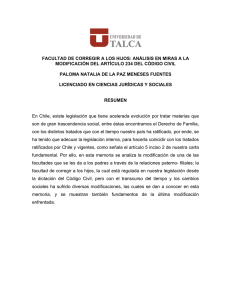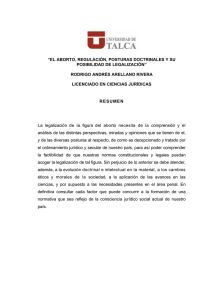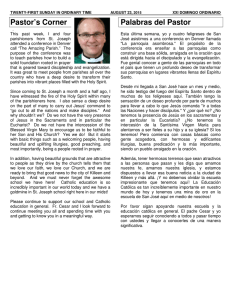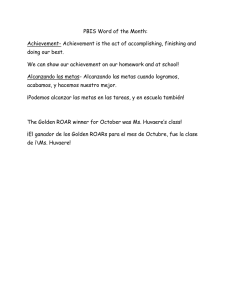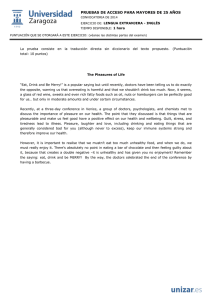End of Life Decision Making for the Faithful
Anuncio
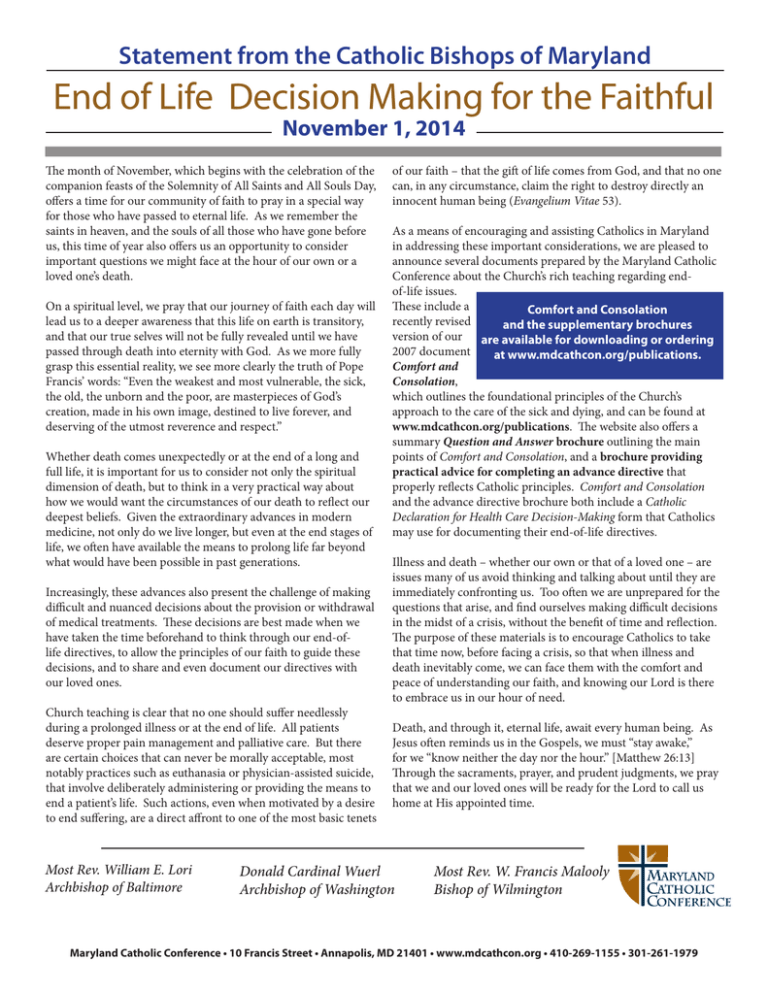
Statement from the Catholic Bishops of Maryland End of Life Decision Making for the Faithful November 1, 2014 The month of November, which begins with the celebration of the companion feasts of the Solemnity of All Saints and All Souls Day, offers a time for our community of faith to pray in a special way for those who have passed to eternal life. As we remember the saints in heaven, and the souls of all those who have gone before us, this time of year also offers us an opportunity to consider important questions we might face at the hour of our own or a loved one’s death. On a spiritual level, we pray that our journey of faith each day will lead us to a deeper awareness that this life on earth is transitory, and that our true selves will not be fully revealed until we have passed through death into eternity with God. As we more fully grasp this essential reality, we see more clearly the truth of Pope Francis’ words: “Even the weakest and most vulnerable, the sick, the old, the unborn and the poor, are masterpieces of God’s creation, made in his own image, destined to live forever, and deserving of the utmost reverence and respect.” Whether death comes unexpectedly or at the end of a long and full life, it is important for us to consider not only the spiritual dimension of death, but to think in a very practical way about how we would want the circumstances of our death to reflect our deepest beliefs. Given the extraordinary advances in modern medicine, not only do we live longer, but even at the end stages of life, we often have available the means to prolong life far beyond what would have been possible in past generations. Increasingly, these advances also present the challenge of making difficult and nuanced decisions about the provision or withdrawal of medical treatments. These decisions are best made when we have taken the time beforehand to think through our end-oflife directives, to allow the principles of our faith to guide these decisions, and to share and even document our directives with our loved ones. Church teaching is clear that no one should suffer needlessly during a prolonged illness or at the end of life. All patients deserve proper pain management and palliative care. But there are certain choices that can never be morally acceptable, most notably practices such as euthanasia or physician-assisted suicide, that involve deliberately administering or providing the means to end a patient’s life. Such actions, even when motivated by a desire to end suffering, are a direct affront to one of the most basic tenets Most Rev. William E. Lori Archbishop of Baltimore of our faith – that the gift of life comes from God, and that no one can, in any circumstance, claim the right to destroy directly an innocent human being (Evangelium Vitae 53). As a means of encouraging and assisting Catholics in Maryland in addressing these important considerations, we are pleased to announce several documents prepared by the Maryland Catholic Conference about the Church’s rich teaching regarding endof-life issues. These include a Comfort and Consolation recently revised and the supplementary brochures version of our are available for downloading or ordering 2007 document at www.mdcathcon.org/publications. Comfort and Consolation, which outlines the foundational principles of the Church’s approach to the care of the sick and dying, and can be found at www.mdcathcon.org/publications. The website also offers a summary Question and Answer brochure outlining the main points of Comfort and Consolation, and a brochure providing practical advice for completing an advance directive that properly reflects Catholic principles. Comfort and Consolation and the advance directive brochure both include a Catholic Declaration for Health Care Decision-Making form that Catholics may use for documenting their end-of-life directives. Illness and death – whether our own or that of a loved one – are issues many of us avoid thinking and talking about until they are immediately confronting us. Too often we are unprepared for the questions that arise, and find ourselves making difficult decisions in the midst of a crisis, without the benefit of time and reflection. The purpose of these materials is to encourage Catholics to take that time now, before facing a crisis, so that when illness and death inevitably come, we can face them with the comfort and peace of understanding our faith, and knowing our Lord is there to embrace us in our hour of need. Death, and through it, eternal life, await every human being. As Jesus often reminds us in the Gospels, we must “stay awake,” for we “know neither the day nor the hour.” [Matthew 26:13] Through the sacraments, prayer, and prudent judgments, we pray that we and our loved ones will be ready for the Lord to call us home at His appointed time. Donald Cardinal Wuerl Archbishop of Washington Most Rev. W. Francis Malooly Bishop of Wilmington Maryland Catholic Conference • 10 Francis Street • Annapolis, MD 21401 • www.mdcathcon.org • 410-269-1155 • 301-261-1979 Obispos católicos animan a los fieles a prepararsepara la Toma de Decisiones al Final de la Vida 1 de noviembre 2014 El mes de noviembre, que se inicia con la celebración consecutiva de la Festividad de Todos los Santos y el Día de los Difuntos, ofrece a nuestra comunidad de fe un tiempo para orar de manera especial por quienes han pasado a la vida eterna. Al recordar a los santos en el cielo, y a las almas de todos aquellos que nos han precedido, esta época del año nos ofrece también la oportunidad de examinar cuestiones importantes que podríamos enfrentar en la hora de nuestra propia muerte o la de un ser querido. En un nivel espiritual, rogamos cada día que nuestro camino de fe nos llevará a una conciencia más profunda de que esta vida en la tierra es transitoria, y que nuestro verdadero ser no se revelará completamente hasta que hayamos pasado por la muerte a la eternidad con Dios. A medida que nos aferramos más a fondo a esta realidad esencial, vemos más claramente la verdad de las palabras el Papa de Francisco: “Incluso los más débiles y los más vulnerables, los enfermos, los ancianos, los no nacidos y los pobres, son obras maestras de la creación de Dios, hechos a su propia imagen, destinados a vivir para siempre, y merecedores de la máxima reverencia y respeto”. Si la muerte llega inesperadamente, o al final de una vida larga y plena, es importante que tengamos en cuenta no sólo la dimensión espiritual de la muerte, sino que pensemos de una manera muy práctica sobre cómo nos gustaría que las circunstancias de nuestra muerte reflejen nuestras creencias más profundas. Dados los extraordinarios avances de la medicina moderna, no sólo vivimos más tiempo, sino que incluso en las etapas finales de la vida, muchas veces tenemos disponibles los medios para prolongar la vida más allá de lo que hubiera sido posible en las generaciones pasadas. Cada vez más, estos avances presentan también el desafío de tomar decisiones difíciles y matizadas sobre el suministro o remoción de tratamientos médicos. Estas decisiones son hechas mejor cuando nos hemos tomado el tiempo para meditar de antemano sobre nuestras directivas para el final de la vida, permitir que los principios de nuestra fe guíen estas decisiones, y para compartir e incluso documentar nuestras directivas con nuestros seres queridos. La enseñanza de la Iglesia es clara de que nadie debe sufrir innecesariamente durante una enfermedad prolongada o al final de la vida. Todos los pacientes merecen el control del dolor y el cuidado paliativo. Pero hay ciertas opciones que nunca pueden ser moralmente aceptables, sobre todo prácticas como la eutanasia o el suicidio asistido por un médico, que implican la administración Most Rev. William E. Lori Archbishop of Baltimore o suministro deliberado de los medios para poner fin a la vida de un paciente. Tales acciones, incluso cuando son motivadas por el deseo de terminar con el sufrimiento, son una afrenta directa a uno de los principios más básicos de nuestra fe - que el don de la vida viene de Dios, y que nadie puede, en ninguna circunstancia, atribuirse el derecho para destruir directamente un ser humano inocente (Evangelium Vitae 53). Como una forma de alentar y ayudar a los católicos de Maryland en el manejo de estas consideraciones importantes, tenemos el placer de anunciar varios documentos preparados por la Conferencia Católica de Maryland sobre la rica doctrina de la Iglesia con respecto a cuestiones relativas al fin de la vida. Estos incluyen una versión recientemente revisada de nuestro documento de 2007 Alivio y Consuelo, que resume los principios fundamentales del enfoque de la Iglesia sobre el cuidado de los enfermos y moribundos, y que se puede encontrar en www. mdcathcon.org/publications. El sitio web ofrece también un folleto con un resumen de preguntas y respuestas delineando los puntos principales de Alivio y Consuelo, y un folleto con consejos prácticos para completar una directiva anticipada que refleje adecuadamente los principios católicos. Tanto Alivio y Consuelo, como el folleto sobre directivas anticipadas, incluyen una Declaración Católica sobre la Toma de Decisiones para el Cuidado de la Salud, formulario que los católicos pueden utilizar para documentar sus directivas para el final de la vida. La enfermedad y la muerte - ya sea la nuestra o la de un ser querido - son temas acerca de los cuales muchos de nosotros evitamos pensar y hablar hasta que inmediatamente nos confrontan. Con demasiada frecuencia, no estamos preparados para las cuestiones que surgen, y nos encontramos tomando decisiones difíciles en medio de una crisis, y sin el beneficio del tiempo y la reflexión. El objetivo de estos materiales es animar a los católicos a tomar ese tiempo ahora, antes de enfrentar una crisis, de manera que cuando la enfermedad y la muerte lleguen inevitablemente, podamos enfrentarlas con la comodidad y la paz de comprender nuestra fe, y saber que nuestra Iglesia está allí para abrazarnos en nuestra hora de necesidad. La muerte, y a través de ella la vida eterna espera a cada ser humano. Como Jesús nos recuerda a menudo en los evangelios, debemos “estar despiertos”, porque “no sabemos ni el día ni la hora.” (Mateo 26,13). A través de los sacramentos, la oración, y juicios prudentes, roguemos para que nosotros y nuestros seres queridos estemos listos para cuando el Señor nos llame a Su casa en el tiempo señalado. Donald Cardinal Wuerl Archbishop of Washington Most Rev. W. Francis Malooly Bishop of Wilmington Maryland Catholic Conference • 10 Francis Street • Annapolis, MD 21401 • www.mdcathcon.org • 410-269-1155 • 301-261-1979
